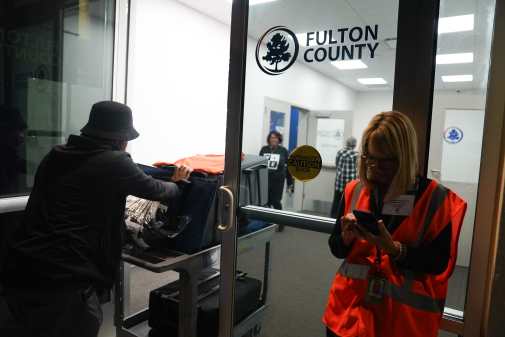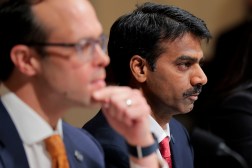CISA moves away from trying to influence content moderation decisions on election disinformation

Leaders at the Cybersecurity and Infrastructure Security Agency continue to express confidence that the nation’s election infrastructure is well-protected for the 2024 elections, citing a litany of improvements to election security made since 2016.
One thing you shouldn’t expect CISA to continue this cycle? Petitioning social media platforms to take down false or inaccurate posts about elections.
In a briefing with reporters Tuesday, Director Jen Easterly said CISA continues to regularly communicate with technology companies, social media platforms and other stakeholders about services that tech companies can offer to state and local election officials and security measures for the election cycle, while also sharing observed tactics from malign actors.
In past election cycles, CISA’s work included sharing information and flagging specific accounts and posts spreading false information for removal or content moderation. However, Easterly made it clear that work would not be part of CISA’s election security mission this time around.
“To be clear, none of these engagements involve CISA discussing content that is to be removed,” Easterly said, adding that the practice is “not our role, that’s not what we do. We’re looking to work with our partners on overall threats to election infrastructure.”
That represents a step up from earlier this year, when CISA officials told reporters they had cut off all communication with social media platforms on election security while facing lawsuits from conservative groups that challenged the government’s authority to press private companies on their content moderation choices.
But it represents a notable shift in CISA’s previous approach to combating disinformation at the outset of the Biden administration. Until mid-2022, CISA regularly forwarded third-party reports of election-related misinformation to the platforms, though the agency also included disclaimers that it would not take any favorable or unfavorable action toward the companies based on how they used the information.
A CISA spokesperson disputed the Supreme Court’s description of when the agency halted the practice, telling CyberScoop “CISA did not provide the switchboarding service for the 2022 election cycle and has no intention to engage in switchboarding for the next election.”
But even before the Supreme Court potentially allowed the federal government to continue those activities, CISA officials expressed interest in pursuing less politically contentious methods to mitigate election disinformation.
In 2020, President Donald Trump famously fired CISA’s founding director via Twitter for publicly rebutting false claims of widespread election fraud. Since then, some congressional Republicans have targeted the agency, accusing it of colluding with social media companies to censor and suppress conservative voices.
Cait Conley, a senior advisor and election lead at CISA, pointed to an explosion of new digital communication tools over the past decade, resulting in “more platforms, more applications, more means for information to be shared and distributed” than ever before. That reality can dilute the impact of removing content or users from any one particular site or platform.
Earlier this year, Conley was critical of what she characterized as the “whack-a-mole” approach to mis- and disinformation that had defined previous elections. On the call Tuesday, she said the agency has been concentrating more on directing voters to accurate or definitive sources for election information than on pressing companies to moderate election denialists and misinformation.
“Where we talk about the most effective way we’re going to be able to mitigate this risk,” she said, it’s “really by having those who are the trusted authoritative sources of information — state and local election officials — coming out and clearly articulating the realities on the ground in the election administration process that they know better than anyone else.”
Conley pointed to the swift coordination earlier this year between New Hampshire state officials when responding to an AI-generated robocall of President Joe Biden as a “textbook example” of successful communication in the face of a disinformation campaign.
Kathy Sullivan, the former state Democratic official whose cell phone number was spoofed in the incident, made a similar argument in an interview with CyberScoop earlier this year.
She and other party officials immediately alerted supporters about the fake audio, contacted media outlets for broader coverage, and engaged agency lawyers to contact law enforcement and the state attorney general.. Within days, the New Hampshire Attorney General announced an investigation into potential voter suppression.
That doesn’t mean CISA is stepping back from its role on election-related disinformation. This past week, Easterly responded to a post on X from owner Elon Musk that suggested the U.S. was overly reliant on paperless voting machines.
Easterly said her response to Musk’s post was her way of “helpfully pointing out what we saw was additional context that was really important to a story that came out.”
“We want to ensure that the media understands who to go to, those state and local election officials, who are working this mission day in and day out so that you can help get that accurate information to voters so they can have confidence that their votes will be counted as cast,” she said.






